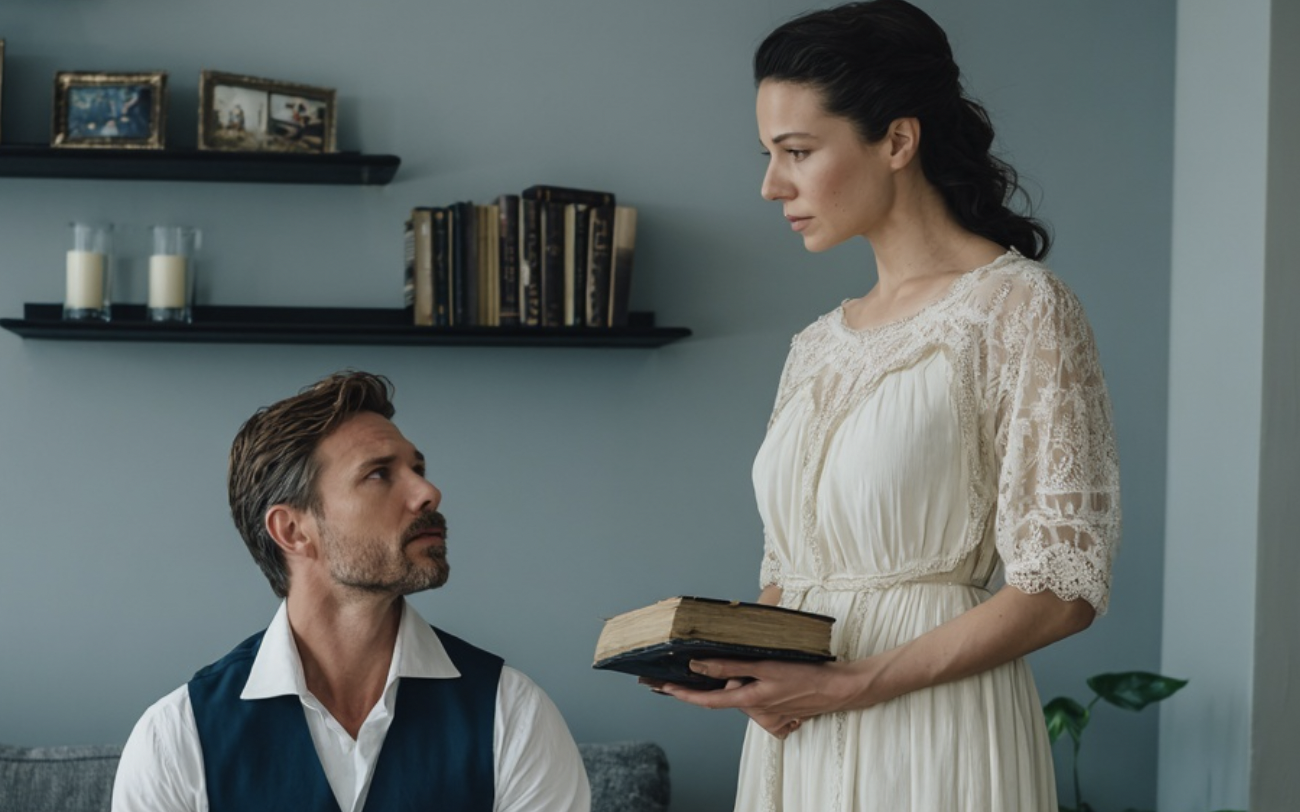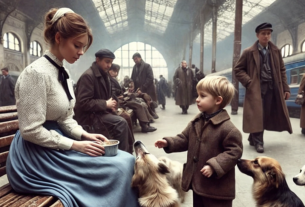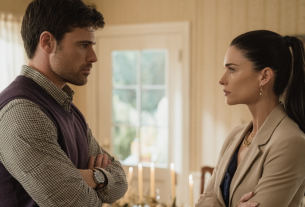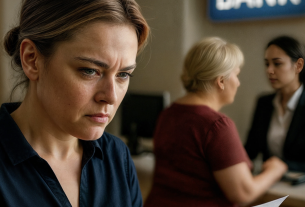My mother was the chief engineer of my existence, the quiet drafter of every blueprint I ever followed. When my father vanished from our lives—leaving behind a six-year-old boy and a woman suddenly carrying the weight of a collapsing world—she became everything celestial to me: sun for warmth, moon for tide, constellations to steer by. She never complained. Still, some nights, when the house went still and the refrigerator hummed like distant traffic, I would hear water running in the kitchen and, beneath it, a muffled, breaking sound. I knew the faucet was a curtain; I knew the sobs were the truth. In that dark, breath-held childhood silence, I made a private vow: I would never cross her. If she decided, I agreed. If she pointed, I went. Her will, my command.
So when I turned thirty-two and she informed me—calm as if reading a grocery list—that she had found the perfect bride, I didn’t argue. It wasn’t inability. I’d dated. But no one passed customs at the border of my mother’s approval. One woman laughed too loudly; another’s blonde wasn’t the right blonde; a third didn’t tilt her head at the precise degree of deference. Each time, I folded. She, who had bled so much for me, must surely know what was best.
I did not see my bride until the wedding. Her name, my mother said, was Sarah. An orphan, raised like an afterthought by tired relatives in a town you’d only find by accident on a paper map. Such scarcity had forged virtues, according to my mother: quiet, obedience, modesty. But the crown jewel—the detail that lit a quiet triumph in my mother’s eyes—was this: Sarah could not speak. Born mute. She communicated by gestures and by a small leather notebook she carried like a second pulse.
“She’s perfect for our family, Michael,” my mother murmured, her voice smooth as a museum floor—no friction, no trace. “No arguments. No shouting. No scenes. Just a grateful young woman who understands her place. You’re doing her a favor; who else would take a wife with a flaw like that?”
The logic was glacial, but I let it slide over me until I went numb. Loneliness is a persuasive advocate; trust in my mother, a lifelong habit. The photograph she produced was the final stamp. Sarah was arresting—slender, with chestnut hair falling in soft cascades, wide blue eyes, a shy mouth curved as if guarding a secret. I felt curiosity flicker. I said yes.
The wedding was not a ceremony; it was a production. My mother staged it at an extravagant country club, all glass and manicured water, the air perfumed with lilies and applause. I stood in a custom suit that fit me like a verdict, a stranger at my own altar. Two hundred guests—mostly my mother’s partners and clients—filled the room, the murmur of their approval already written into the script. It was, as much as anything, a testimonial: look what she built.
The doors parted. Sarah entered, more luminous than the photograph had promised. A veil softened her into myth. She moved with a deliberate, unspilled grace, eyes lowered, steps measured. Through the vows she was the definition of demure—nodding at their cue, taking the pen like it was a feather and writing her new name with a ballerina’s wrist. People leaned forward, charmed. My mother radiated a holy, blinding pride.
At the reception, Sarah sat beside me like a porcelain saint—beautiful, still, faultless. She smiled when smiled at, tipped her head when jokes were tossed across the table, and when addressed directly, she opened the little notebook and answered in neat, economical lines. I felt the old reflex: my mother had done it again. The solution, immaculate.
In the taxi to the apartment my mother had helped me buy—new floors, new paint, new life—Sarah watched the city blur by, her reflection slipping in and out of the dark glass. A small, private smile played on her lips, unreadable as a closed book. Satisfaction, I thought, settling like a cloak around my shoulders. Not love, not yet—something steadier, quieter. A beginning with smooth edges.
I opened the door. The place smelled like fresh paint and possibility. The click as the door shut rang in the emptied rooms. I turned to her, ready—awkward, hopeful—to begin.
She met my eyes. The shy smile disappeared, peeled back like a mask. In its place was something keen and lucid, a sharpness that caught the light.
“Finally,” she said, voice bright and bell-clear. “Just us, Michael. We can stop performing.”
I stopped breathing. Words lost their meaning in the white noise filling my skull. “What?” I managed. “You—my mother said—you’re—” The sentence fell apart in my mouth. “You’re mute.”
Sarah’s mouth tilted into a weary, almost amused smirk, an expression that felt impossible on the face of the silent girl from an hour ago. She slipped out of her heels, padded to an armchair, and sank into it, the white dress pooling like spilled milk. “Mute? No. That fiction was your mother’s stroke of genius.” She exhaled, the sound full of fatigue older than the day. “She said you needed a gentle, obedient wife who wouldn’t interfere with your perfect little duet.”
Her words kept landing and landing. My mind refused delivery. It stamped them RETURN TO SENDER. “Who are you?” I whispered, like a man asking the ocean its name.
“Oh, that’s long.” She loosened the tiny hooks at the collar of her dress and crossed to the window, drawing the curtains until the room softened into an intimate dusk. When she turned back, her eyes carried something I hadn’t seen before: a cold glint of resolve, anger burnished into steel, and the cool satisfaction of a door finally opening. “Did your mother never mention me?” she asked softly, iron threaded through the silk. “Our family? What happened twenty-five years ago?”
I shook my head, my body a collection of trembling parts. The disbelief was not a wave; it was a riptide.
“Then listen,” she said. “Because this began long before you could count years. If you want to understand why I’m here—and what happens next—you need every word.”
My knees went unreliable; I sank onto the sofa.
“You really believe your father just left?” she asked, and the question jabbed under my ribs. “Ran off with another woman, the way your mother always told it?”
That story was the ground I’d been taught to walk on: father the deserter, mother the saint. “Yes,” I said, fists tightening like a habit. “He abandoned us.”
Sarah’s head moved in a slow, sorrowful no. “He didn’t leave you, Michael. He never would have. You were his north.”
“How do you know?” Anger burst through the fog—hot, defensive, grateful to have somewhere to go.
“I know,” she said quietly, “because your father was my mother’s brother. He was my uncle.”
The air thinned. The words hovered, impossible and precise. Cousin. My cousin. A family I’d been taught was dead air. Why would my mother—
“Your mother erased us from your map,” Sarah continued, her voice hardening into the edge of a blade. “After what she did to your father, it served her to make sure you never heard another version of the story.”
“What did she do to him?” I asked, and the question tasted like ice.
She reached into her purse and pulled out a photograph gone soft at the corners. A man who could have been my reflection stood with a woman I didn’t recognize and a small girl with wide, curious eyes. “Your father,” she said, and her voice gentled. “My mother—his sister. And me, five years old. The last picture we took together. A week before he disappeared.”
“Disappeared? My mother said—”
“He didn’t walk away,” Sarah said. “He went missing. He left for a business meeting and never came back. A week later they pulled his car from a lake. No body.”
I stared until the faces swam. My father’s features—my features—looked back at me from another life. “But why would she—”
“Your parents built a tech company together,” Sarah said, the warmth draining from her tone. “Co-founders. But most of the shares were in his name. After he vanished, everything flowed to her. And days before he disappeared, she took out a massive life-insurance policy on him.”
I felt the blood leave my face. “That’s not true.”
“Is it?” She slid a small, battered notebook from her bag and set it on the table between us as if placing a matchbook on gasoline. “Your father’s journal. My mother kept it hidden. Your mother never knew it survived. Read before you decide I’m lying.”
She tapped the cover once, lifted her gaze to mine, and her voice softened in a way that undid me. “I’m giving you a few hours alone with him,” she said. “Don’t call your mother. Not yet.” Then she was at the door, a muted click, and the apartment swallowed her absence.
Silence expanded until it pressed against my eardrums. The journal sat where she’d left it, small and ordinary, unbearable. To open it felt like treason against the woman who had been my entire sky. Not to open it felt like treason against the man I’d been taught to condemn. My hand shook as I reached.
The handwriting on the first page was a shock—the same elegant script that had once looped across a handful of birthday cards, artifacts from before the void.
March 15th: Fought with Elizabeth again. She’s pushing for more control of the company, but I can’t give it to her. Not when I suspect she’s working with competitors behind my back. Michael drew a picture of our family today. Such a bright kid. I hope I can protect him from all of this.
I turned the page, my heart pounding so hard it rattled the room.
March 20 — Elizabeth is… off. She whispers on the phone and goes quiet when I walk in. Today I watched her meet Bob from Innovatech—our biggest rival—outside the café on 3rd. She called it a coincidence. I watched them trade envelopes. Not a coincidence.
With every entry I wrote after that, the halo around my sainted mother cracked. I recorded her secrecy, the odd calls that cut out when I picked up the extension, the files I found tucked beneath the false bottom of her desk drawer—memos about back-channel talks, unsigned agreements, and her sudden insistence that I increase my life insurance “for Michael’s sake.”
April 10 — Anonymous message. A warning: “Elizabeth is planning to get rid of me.” Paranoia? Maybe. But I can’t ignore it. I’m sending Michael to my sister, Karen, until I understand what’s happening.
The last entry was dated the day before he disappeared.
April 15 — Proof. Definitive. She’s been selling our proprietary designs. Meeting a lawyer tomorrow to start divorce proceedings. Must protect Michael. I’m scared for my life, more scared for my son. If anything happens to me, Karen must know the truth: Elizabeth is dangerous. She cannot be allowed custody.
I closed the notebook. My tears had wrinkled the paper so the ink bloomed like bruises. His love for me, his terror for my safety—every line pulsed with it. My childhood, my identity, the altar I’d built to my mother’s goodness—everything collapsed in a breath.
When Sarah came back into the room, I didn’t speak. I didn’t need to. She read the ruin on my face.
“It’s not enough,” I said, my voice sandpapered raw. “It’s his handwriting, his fear—but it doesn’t prove she actually… did anything.”
“I know,” Sarah answered, jaw set. She lifted another folder. Inside: a private investigator’s reports, copies of bank statements showing large, sour-smelling transfers, sworn statements about Elizabeth meeting men who never used their real names. The picture it painted was terrifying—and circumstantial.
“That’s why I had to marry you,” she said, steady, unblinking. “Your mother is meticulous. The one piece that will end this—the smoking gun—is in her house. Hidden. And now, as your wife, I can get close enough to find it.”
“You want to use me to search my mother’s home?” I asked, anger rising like fire under ice.
“I think you want the truth as much as I do,” she said. “You’re already questioning everything. I’m offering you a way to answer it.”
She was right. I needed to know.
The dinner at my mother’s was a dream inside a nightmare. I wore the smile of the dutiful son; Sarah, the luminous, silent bride. Elizabeth floated room to room, the benevolent queen of a perfect tableau, laughter sparkling off crystal and silver. But beneath the pleasantries, something hunched and hungry watched us all.
After dinner, as guests drifted toward the conservatory and a piano began to tinkle out polite music, Sarah breathed, “Now. Keep her busy.”
I intercepted my mother with small talk sharpened into a blade: how had she found Sarah, what did she think of the dress, had she met Sarah’s family, and—oh—what was Sarah’s maiden name again? For a heartbeat, something slipped. Panic flashed in her eyes, a tremor beneath the lacquer. Then the mask snapped tight.
Sarah reappeared a few minutes later, the room buzzing around us. Our eyes locked across the crowd. The smallest nod. She’d found it.
The drive home was a stretch of taut, wordless wire. Inside the apartment, Sarah slid a flash drive into her laptop. “From her study,” she said, fingers sprinting across keys. “There was a folder labeled with your father’s name—David.”
It was locked, password-gated, smug. Sarah—raised by my aunt Karen, who’d taught her to outthink locked doors—bypassed the encryption in minutes.
The folder opened into a gallery of dread. Telephoto shots of my father from across streets and restaurants and parking lots. PI logs detailing his schedule to the minute. And a final document, titled with surgical simplicity: “The Plan.”
It was meticulous. Dates. Addresses. Retainers for “specialists.” A timetable that marched to a single conclusion. And the last, damning line: After David is removed, the startup is fully mine. Michael stays with me. No contact with David’s family.
We stared at the screen, the proof casting a cold light across the room—when the doorbell rang.
I checked the peephole. My mother.
“I had a feeling,” she said, sweeping in, eyes combing the apartment with a predator’s calm. She stopped on Sarah. “Your wife,” she murmured, voice dropping, “is not who she says she is.”
Sarah didn’t flinch. “You’re right, Elizabeth. I have an agenda. To find proof of what you did to my uncle.”
No mask, not anymore. My mother’s face went still, then cruelly amused. “Karen’s girl,” she said, almost pleased with herself. “I should have guessed.” She laughed, a sound as empty as an abandoned warehouse. “You have nothing. You never will.”
“We have his journal,” Sarah said. “And the files from your computer.”
My mother turned to me, fury cutting through the room like a wire. “You let her?”
“I want the truth,” I said. My hands were shaking. I didn’t hide them.
“The truth?” She spat the word like a seed. “The truth is your father was weak. He wanted ethics and principles. I wanted to win. He was leaving, taking you, burning down what I built. So yes—I did what was necessary.”
She confessed—clean, almost bored. Not a flicker of regret. A line item on a balance sheet.
“I protected our interests, Michael. Yours. Because of me, you had everything.”
“You killed him,” I said, and the words sounded like they belonged to some other man in some other life.
“A necessary decision,” she replied. “As was handling your meddling aunt five years ago. And as was drugging your little wife tonight.”
My stomach dropped. The champagne.
“Relax,” she said, shark-soft. “A sleeping agent. She’ll live. If you stop this ridiculous crusade. Divorce her. Pretend she never existed. Or she might have… an accident. Like her mother.”
I unbuttoned my shirt, slow and deliberate, and lifted the tiny microphone Gregory Parker—Sarah’s adoptive father and my father’s old partner—had pinned there an hour before. “Now we have it,” I said. “Your confession. Recorded.”
The door crashed open. The room flooded with blue windbreakers and hard voices. A detective Gregory had on standby moved first. Handcuffs clicked like the punch line to a terrible joke.
My mother looked at me as they led her away, eyes like knives dipped in winter. “You’ll regret this, Michael,” she hissed. “You think you’ve won? I own this city. When I get out, you’ll learn what betrayal costs.”
The trial ground on for months, a relentless threshing of evidence and testimony. But the recording, the journal, the files—together they were a wall. The verdict landed with the finality of a slammed cell door: guilty on all counts. Murder. Conspiracy. Attempted murder.
Afterward came the slow work of living. Sarah and I—tied by blood, by loss, by the fire we walked through—chose separate paths. Not enemies. Not lovers. Something steadier: the kind of family that survives truth. I took the company and rebuilt it in the shape of my father’s ghost—principles, transparency, work that didn’t rot your soul.
Years later I met Chloe. She was gentle without being fragile, kind without being naïve. She saw me—not the son of a monster, not a victim, just a man learning how to stand in his own life. With her, trust returned like rain after a long dry season. Love followed.
My mother will die in prison. I don’t visit. I don’t write. The woman I adored was a story she told me; the author was always a stranger. The truth is that my mother died to me a long time ago—in a quiet kitchen, water running to drown out her sobs—leaving only the architect of a crime.
My father, the man I hardly knew, I visit every week. Not at a grave, but in Gregory’s stories, in the photographs Sarah keeps sending, and in the mirror where his features look back at me, softened by time and understanding. He wasn’t a traitor. He was a hero. And I am his son.



